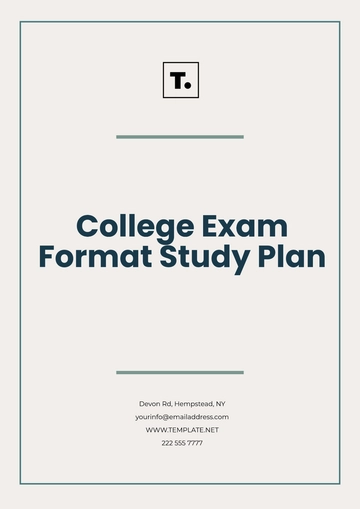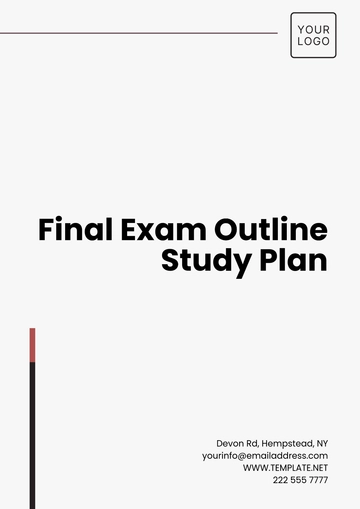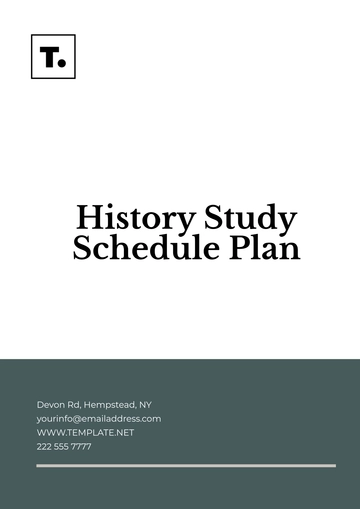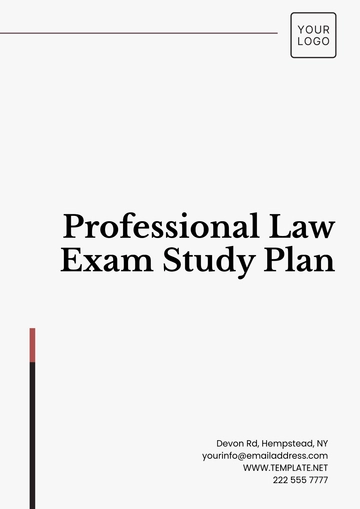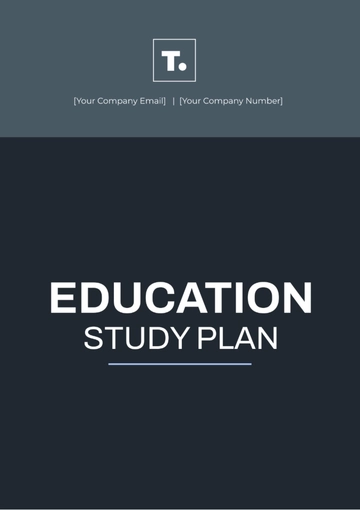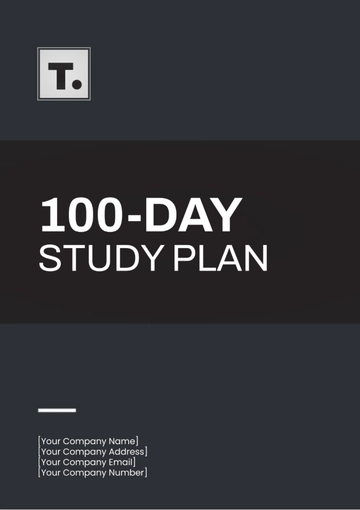Free Law Firm Study Plan

1. Introduction
At [Your Company Name], our commitment to excellence in legal practice is underpinned by a comprehensive Law Firm Study Plan designed to ensure continuous professional development and keep pace with evolving legal proceedings and technologies. This plan is crafted to bolster expertise across various legal fields, innovate our work environment, and ultimately enhance client satisfaction. Through this structured approach, we aim to sustain our competitive advantage, fostering a culture that values sharp legal acumen and upholds the highest standards of legal service.
2. Objective Setting
The core aim of our study plan is to enhance the professional capabilities of all members within [Your Company Name], from our dedicated interns to the seasoned senior partners. Our specific objectives are set to address the needs of a modern law firm:
Technology Mastery: Integrating the latest legal technologies to streamline case management and increase operational efficiencies.
Trend Analysis: Gaining insights into emerging legal trends to better prepare for shifts in the legal landscape.
Process Optimization: Enhancing the efficiency of legal processes to reduce turnaround time and improve case handling.
Client Engagement: Developing advanced client interaction skills to improve communication and negotiation outcomes.
Professional Development: Promoting an ethos of continuous learning and professional growth through targeted training and resources.
These goals are designed not only to advance individual careers but also to fortify the collective proficiency of our firm, ensuring we remain at the forefront of the legal sector.
3. Skills Assessment
To effectively tailor our training programs, we begin with a comprehensive skills assessment for each member of our firm. This evaluation is crucial in identifying both strengths to build upon and areas needing enhancement. Our assessment focuses on:
Legal Expertise: Deep dives into specific legal domains where updated knowledge or additional training might be needed.
Technological Proficiency: Evaluation of each member's ability to utilize current legal software and tools, with a view to identifying candidates for advanced tech training.
Soft Skills: Assessing skills essential for superior client interaction and effective case management, such as communication, negotiation, and problem-solving abilities.
The results of these assessments will direct the development of customized learning paths tailored to the needs and career stages of our staff, ensuring that everyone from junior lawyers to senior partners has access to relevant, effective training opportunities.
4. Learning Modules Design
Drawing on the insights gained from our thorough skills assessments, we design targeted learning modules that are structured to address key areas of professional development:
Advanced Legal Theories and Practices: Courses designed to deepen understanding of complex legal principles and their practical applications in various fields of law.
Case Study Analysis and Strategy Formulation: Interactive sessions that involve real-world cases, encouraging analytical thinking and strategic planning.
Legal Software and Tools Training: Hands-on training in the latest legal technologies, aimed at enhancing efficiency and accuracy in legal documentation and case management.
Client Communication and Negotiation Skills: Workshops focusing on effective communication, negotiation tactics, and client relationship management to ensure successful outcomes.
Leadership and Team Management: Leadership training tailored to legal professionals, focusing on team dynamics, conflict resolution, and motivational strategies.
Each module is equipped with comprehensive resources, practical assignments, and robust assessment tools designed to effectively measure progress and competency gains. Our approach ensures that every member of [Your Company Name] not only meets but exceeds the demands of modern legal practice, prepared to tackle challenges with confidence and expert skill.
5. Training Schedule
At [Your Company Name], a well-structured training schedule is pivotal to ensure consistent learning and career development across the firm. Our detailed annual training program is designed to cover essential skills and knowledge areas through focused modules, each facilitated by experts in their respective fields.
Each training module is carefully scheduled to avoid conflicts and maximize participation, ensuring that all members can attend without disrupting their ongoing casework.
Month | Module | Duration | Trainer |
|---|---|---|---|
January | Advanced Legal Theories | 2 Weeks | Jonathan Wilkins |
February | Case Study Analysis | 2 Weeks | [Name] |
March | Legal Software Tools | 1 Week | [Name] |
April | Client Communication Skills | 1 Week | [Name] |
May | Leadership and Management | 2 Weeks | [Name] |
Each training module is carefully scheduled to avoid conflicts and maximize participation, ensuring that all members can attend without disrupting their ongoing casework.
6. Mentorship Programs
To bridge the gap between theoretical knowledge and practical application, [Your Company Name] is proud to introduce a structured mentorship program. This program pairs less experienced lawyers with seasoned veterans from within the firm. Our mentors are not only experts in their fields but also skilled educators, committed to transferring their knowledge and fostering professional relationships that contribute to a supportive workplace culture.
Each mentor-mentee pair will set specific, measurable objectives at the beginning of their collaboration, with clear benchmarks for success. These goals may range from mastering particular legal skills to improving client relations or leadership abilities. The mentorship program is designed to be flexible, accommodating the unique professional development needs of each mentee while ensuring alignment with the firm’s overall strategic goals.
7. Performance Evaluation
Performance evaluations at [Your Company Name] are integral to the continuous improvement of our Law Firm Study Plan. These evaluations are conducted periodically to assess:
Legal Knowledge Application: How well legal principles are understood and applied in practical scenarios.
Software Proficiency: Effectiveness in using legal technologies that enhance productivity and case management.
Client Satisfaction: Feedback from clients regarding the professionalism and outcome of their cases.
Peer and Self-Assessment: Insights from colleagues and self-evaluations to identify strengths and areas for improvement.
Contribution to Knowledge Base: Active participation in expanding the firm’s repository of case studies, white papers, and other resources.
The results from these evaluations help us refine our training modules and methodologies, ensuring they remain relevant and effective in addressing the needs of our staff and the demands of the legal market.
8. Continuing Legal Education (CLE)
At [Your Company Name], adherence to Continuing Legal Education (CLE) requirements is not only a regulatory necessity but also a vital element of our commitment to legal excellence. Our CLE program is integrated into our annual training schedule, ensuring that all legal staff, regardless of their level, participate in these critical sessions. These sessions are designed to keep our team informed and compliant with the latest laws, regulatory changes, and ethical standards essential for practicing law. By prioritizing CLE, we maintain our legal licenses and enhance our professional qualifications, thereby reinforcing our reputation as a leading legal institution committed to upholding the highest standards of the legal profession.
9. Feedback Mechanisms
At [Your Company Name], we recognize the importance of feedback as a pivotal component of continuous improvement in our Law Firm Study Plan. To ensure we are meeting the needs of our team and aligning with the best practices in legal training, we have implemented various mechanisms to collect and analyze feedback:
Regular Surveys: We conduct detailed surveys after each training module to gather insights on the content's relevance, the effectiveness of the trainers, and the overall participant satisfaction. These surveys are designed to be straightforward yet comprehensive, allowing participants to provide both quantitative ratings and qualitative feedback.
Suggestion Boxes: Placed around the office and accessible through our intranet, suggestion boxes encourage spontaneous and anonymous feedback. This allows our team to freely express ideas for improvements or new topics they wish to explore in future training sessions.
Focus Groups: Periodically, we organize focus group discussions that bring together participants from various levels within the firm to discuss the strengths and areas for improvement in our training programs. These sessions are facilitated by an independent moderator to ensure open and constructive dialogue.
Follow-Up Interviews: For a more personalized feedback approach, follow-up interviews are conducted with participants, especially after introducing new modules or significant changes to the training program. This helps us understand the impact of these changes and make iterative improvements.
The insights gained from these feedback channels are invaluable. They enable us to continuously refine our training approaches, ensuring they remain effective, engaging, and aligned with the evolving needs of our legal staff.
10. Scalability and Adaptability
As the legal industry evolves, so must our training programs. [Your Company Name] is committed to scalability and adaptability in our Law Firm Study Plan, ensuring it can accommodate changes in legal practice, technology, and market dynamics:
Modular Design: Our learning modules are designed to be easily updated or expanded, allowing us to integrate new legal developments or technologies as they arise.
Scalability Provisions: We have provisions for increasing the frequency of sessions, adding new topics, or expanding the participant capacity to meet growing demands or to address specific industry trends.
Adaptive Learning Paths: Customizable learning paths that allow for adjustments based on individual performance evaluations, changes in career focus, or new legal specializations.
Technology Integration: Continual assessment and integration of new educational technologies and platforms to enhance the delivery and effectiveness of our training.
These strategies ensure that our training efforts are proactive and responsive, enabling [Your Company Name] to remain at the forefront of legal education and practice.
11. Conclusion
The Law Firm Study Plan at [Your Company Name] represents a comprehensive and dynamic approach to professional development within the legal sector. By adhering to this structured plan, we are committed to fostering a culture of continuous improvement and excellence. Our systematic training and development initiatives are designed to enhance the competencies of our team members at all levels, from junior staff to senior partners. As a result, we can deliver superior legal services, maintain high levels of client satisfaction, and ensure our firm continues to thrive in a competitive and rapidly changing environment. By investing in our people, we cement our reputation as a leader in the legal field, dedicated to upholding the highest standards of practice and professional integrity.
- 100% Customizable, free editor
- Access 1 Million+ Templates, photo’s & graphics
- Download or share as a template
- Click and replace photos, graphics, text, backgrounds
- Resize, crop, AI write & more
- Access advanced editor
Unlock the potential of your law firm's strategic planning with Template.net's Law Firm Study Plan Template. Tailored for legal professionals, this editable and customizable tool empowers you to streamline your study plan effortlessly. Crafted with precision, it integrates seamlessly with our AI editor for a seamless experience. Elevate your firm's strategies with ease.





